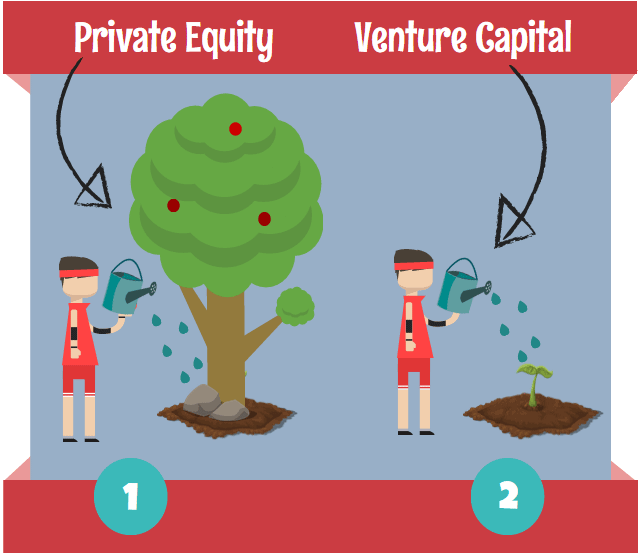
How does Private Equity perform vs. Venture Capital for LPs
The world of alternative investments is vast and encompasses many asset classes. Two of this space’s most prominent investment strategies are Private Equity and Venture Capital. These asset classes have unique characteristics, risks and potential rewards for limited partners (LPs), i.e. investors in Private Equity and Venture Capital funds. In this article we will explore the performance of Private Equity versus Venture Capital for LPs.
Understanding Private Equity and Venture Capital
Before diving into the performance comparison, it’s essential to understand the fundamental differences between Private Equity and Venture Capital.
Private Equity
Private equity refers to investments in non-publicly traded private companies. These investments often involve significant capital infusions to help companies grow, restructure or improve their operations. Private equity firms typically acquire controlling stakes in these companies and work closely with management to create value for all stakeholders.
Venture Capital
Venture Capital is a type of Private Equity focused on investing in early-stage, high-growth potential startups. Venture capitalists provide financing, strategic guidance and networking opportunities to help these startups scale and achieve success. The investments in Venture Capital are often smaller and more speculative than those in Private Equity, as the companies receiving funding are typically at an earlier stage in their development.
Performance Comparison: Private Equity vs. Venture Capital
Several factors come into play when comparing the performance of Private Equity and Venture Capital for LPs.
1. Returns
Historically, Private Equity has consistently generated higher returns than Venture Capital. According to the Cambridge Associates US Private Equity Index, the 10-year annualised return for Private Equity was 13.7% as of Q2 2021, while the 10-year annualised return for Venture Capital was 11.9%. Other sources see an even wider spread between the different types of Private Equity (Fund-of-funds, Growth, Buyout and other) and Venture Capital, such as the analysis depicted below.

However, this does not mean that Venture Capital investments are inherently less attractive – the risk-return profile is different, with Venture Capital investments carrying higher upside potential and risks.
2. Risk
Venture capital investments are inherently riskier than Private Equity investments. Early-stage companies face numerous challenges, such as product-market fit, market adoption and competition. As a result, many startups fail, and Venture Capital investors must rely on a few successful investments to generate most of their returns.
By contrast, Private Equity investments typically involve more established companies with proven business models and cash flows. While risk is still involved, Private Equity investors can often mitigate these risks through active management and operational improvements.
3. Diversification
Both Private Equity and Venture Capital investments can provide valuable diversification benefits for LPs. These asset classes have historically exhibited low correlations to traditional asset classes, such as stocks and bonds, which can help reduce overall portfolio risk.
However, the level of diversification within each asset class can vary. Venture capital investments are often more concentrated in specific sectors, such as technology or healthcare, while Private Equity investments can be more broadly diversified across industries.
4. Liquidity
Private equity and Venture Capital investments are illiquid, meaning they cannot be easily bought or sold like publicly traded stocks. Investment horizons for both asset classes typically range from five to ten years, which can pose challenges for LPs who require liquidity.
Winterberg Group’s Approach: A Balanced Strategy
At Winterberg Group, we recognises the distinct characteristics of Private Equity and Venture Capital investments. While we are focusing on Private Equity, we have developed a balanced approach to maximize returns while mitigating risks for our LPs.
1. Sector Focus
Winterberg Group strategically invests in high-growth sectors to capitalise on market trends and opportunities. By focusing on industries such as technology, healthcare, water, certification and sustainability, Winterberg Group is well-positioned to benefit from the growth potential of these industries.
2. Active Management
Winterberg Group takes an active approach to managing its investments. By working closely with portfolio companies, we can help drive operational improvements, enhance efficiencies and unlock value. This hands-on approach is a crucial differentiator for the Winterberg Group, as it allows them to generate value from their investments beyond mere capital infusions.
Fabian Kroeher, Co-Founder and Executive Director of Winterberg Group, brings a wealth of knowledge and experience to the table. With a deep understanding of the investment landscape, Fabian Kröher and his team have demonstrated a consistent ability to identify attractive investment opportunities, conduct thorough due diligence and execute value-enhancing strategies.
3. Diversification
Winterberg Group understands the importance of diversification for their LPs and seeks to provide a balanced mix of Private Equity and Venture Capital investments in their portfolio. This approach allows us to benefit from the high return potential of Venture Capital investments while also enjoying the relative stability of Private Equity investments.
4. Selectivity
The Winterberg Group is highly selective in choosing its investments. We conduct thorough due diligence on potential investment opportunities to ensure we align with the firm’s strategic objectives and growth potential. This disciplined approach helps Winterberg Group mitigate risks and maximize returns.
Final Words
In conclusion, Private Equity and Venture Capital offer unique benefits and risks for limited partners. While Private Equity investments tend to provide more stable returns and involve less risk, Venture Capital investments offer higher growth potential but with increased risk. The proper allocation between these asset classes depends on an LP’s specific investment objectives, risk tolerance and diversification needs.
“The Winterberg Group has developed a balanced approach to investing in Private Equity and Venture Capital. By focusing on high-growth sectors, active management, diversification and selectivity, we seeks to achieve an attractive risk-return profile”, says Fabian Kröher, Executive Director at Winterberg Group.
